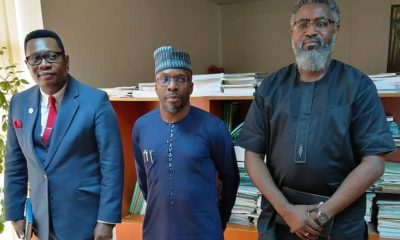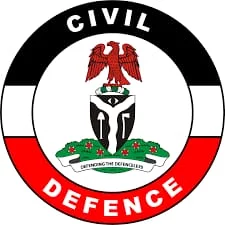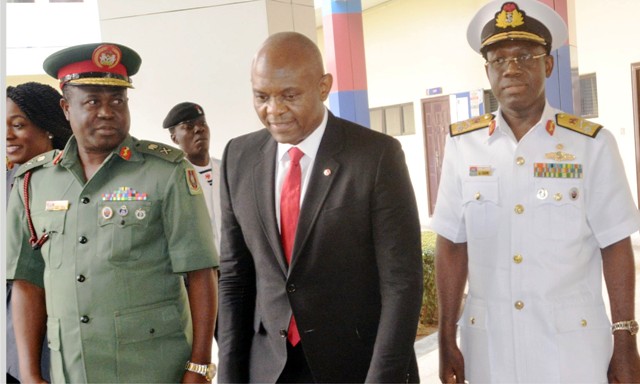Niger Delta
Bayelsa Decries Insecurity, Expropriation, Blames Oil Firms

The Bayelsa State Government has accused multinational oil companies, especially of initiating deliberate policies and programmes to short change oil bearing communities.
This is just as the government condemned in strong terms the recent criminal attack on Amabulou Community over community leadership elections that led to the death of one Mr Omolojo Etolor.
The state Deputy Governor, Senator Lawrence Ewhrudjakpo, handed down the condemnation at a meeting with some concerned members of the Amabulou Community of Ekeremor Local Government Area in Government House, Yenagoa.
Senator Ewhrudjakpo, in a statement by his Senior Special Assistant on Media, Mr Doubara Atasi, noted that the cluster board programme being run by Shell was causing more harm than good to the people and state governments in the Niger Delta.
He pointed out that the primary duty of every government was to protect lives and property, and therefore, the present administration would not hesitate to address any issue or situation threatening peace and security in the state.
The Deputy Governor said SPDC and other oil companies had never shown genuine interest in the development of the Niger Delta, rather they design policies and programmes that cause disaffection amongst the people.
According to him, the state government is worried by the insecurity problem associated with SPDC’s cluster boards in most communities and will soon take measures to address it in a comprehensive manner.
“Shell has not been fair in their dealings with the people of the Niger Delta. Whether you look at it from the economic, social and development points of view, you will find out that they (oil companies) have failed in their responsibility”.
“It has always been a tale of woes with Shell. Look at what they are doing to our people with their cluster board programme, causing problems in our communities. So the State Executive Council is worried.
“If Shell was responsible and responsive enough in discharging their duties, we will not have some of the military men permanently in our creeks. They always design programmes that will serve their ends to our own detriment”, he added.
“As a government, we are seriously looking at this issue at the State Executive Council meetings. But I won’t be able to tell you today, the prescription the state government has up its sleeves for this reckless show of irresponsibility”, the deputy governor reiterated.
Commenting on the Amabulou incident, the Deputy Governor assured that government would leave no stone unturned in its determination to bring to justice all those who played a role in the killing of Mr Etolor.
While consoling the Etolor family, Senator Ewhrudjakpo restated the present administration’s zero tolerance stance on criminality and warned youths not to allow anybody deceive them with any assurance of invincibility to commit crimes.
In their contributions, the lawmaker representing Ekeremor Constituency Two, Mr Wilson Ayaokpo and the Chairman of Ekeremor Local Government Area, Hon. Perekeme Bertola, attributed the threat to peace in Amabulou and other communities in the area to tussle for membership of the SPDC cluster boards.
By: Ariwera Ibibo-Howells, Yenagoa
Niger Delta
Sexual Harassment: Court Sentences UNICAL Prof To 5yrs Imprisonment
Niger Delta
FRSC Begins Free Vehicle Safety Checks In A’Ibom
Niger Delta
Monarch Lauds Fubara Over Speedy Execution Of Projects In Rivers
A traditional ruler in Rivers State, His Royal Highness, Epelle D. E. Asukokpong has commended the Rivers State Governor, Sir Siminalayi Fubara, for ensuring speedy execution of ongoing projects across the state.
Asuk-okpong, who is the Paramount Ruler of Egwe-Asukokpong in Asarama District, in Andoni Local Government Area lauded the Governor during his inspection tour with his Cabinet on a section of Andoni road linking Oyorokoto fishing community in the area, yesterday.
The Paramount Ruler who expressed satisfaction with the pace of work on the road, commended the Governor for the seriousness he attached to the project.
According to him, “there is a serious motivation on the part of the company handling project.
“With what am seeing today I can say that the Company has redoubled its effort by 50 percent after the Governor’s inspection of the Road on October 28, 2025.
“I thank God for His intervention in the political impasse that was trying to slow down the pace of development in the State.”
The Traditional Ruler, who doubles as PRO of Asarama Divisional Council of Traditional Rulers and Secretary Asarama Town Council of Traditional Rulers said traditional rulers in his domain would continue to support the efforts of Government at all levels to ensure security and development in the area.
He also appealed to the State Government to intervene in the abandoned Asarama, Engendem, Unyeada Ring Road in the area.
It would be recalled that the Rivers State Governor, Sir Siminalayi Fubara, on October 28, 2025, visited the Andoni Atlantic Ocean shoreline to inspect the 13-kilometre road project currently under construction.
The road, when completed, will provide direct access to the beach and link Oyorokoto — a fishing settlement in — to Ngo, the headquarters of Andoni Local Government Area which has since been linked to mainland Ogoni by the Governor.
-
Sports2 days ago
170 cycling challenge to make Lagos global hub for sports tourism
-

 Business1 day ago
Business1 day agoNigeria’s Inflation Rate Eases To 16.05% – NBS
-

 News2 days ago
News2 days agoNSCDC Arrests 20 Suspects For Alleged Threat To National Security
-
Health1 day ago
Police Hospital Reports More Malaria Incidence
-
Politics2 days ago
Kebbi Schoolgirls’ Abduction Tragic, Unacceptable – Northern Govs
-
News1 day ago
Kalabaris Celebrate New Year Amid Fanfare
-
Sports2 days ago
Winners emerge at TotalEnergies charity golf tourney
-

 Business1 day ago
Business1 day ago‘Entrepreneurs, Not Foreign Aid Drive Nigeria’s Growth’

